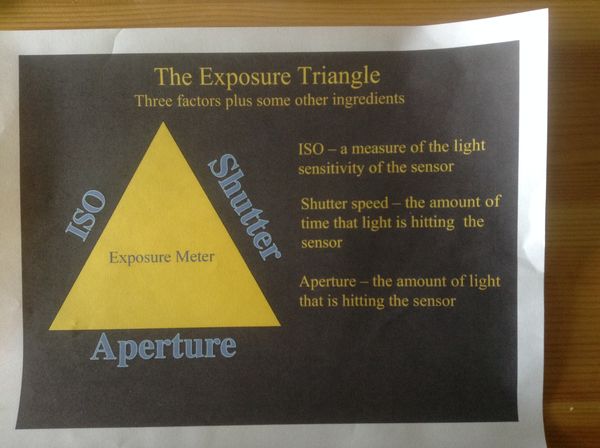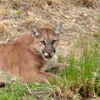New to photography, where to begin??
Jun 14, 2018 09:41:42 #
Why don't you join a photo club yourself. I belong to 2. One of my clubs has it's members submit 4 images per month and at the monthly meeting they project them while a photography expert critiques them. After watching and listening to various different experts explain what's wrong with the images and what's right about the same images, you learn what you can do to improve your skills. Also, once a month they have another meeting with an expert that lectures on a certain aspect of photography. Sometimes it might be using a software for processing your images, and other times it might be something like studio lighting. They also have field trips you can go on with the group or you can just go out and take pictures for the assignment on your own time. The photos they critique are the photos you take for the assignment, or any of the several field trips they plan. So the assignment might be something like "how low can you go" and the field trips might be going to the Carlsbad flower fields, and the horse races, and be beach down by La Jolla. So you submit photos taken for any of the things the club does or the assignment.
mleemcc wrote:
Hi! I’m a hs art teacher and painter. I started ... (show quote)
Jun 14, 2018 09:57:46 #
mleemcc wrote:
Hi! I’m a hs art teacher and painter. I started ... (show quote)
As an art teacher, you already know it is all about light. That part you already know, so it is only the mechanics you need to learn. In that respect, the camera is an eye. The lens focuses light on a retina - the sensor- and the resulting electrical impulses are transmitted to a processor (the brain). The amount of light is controlled by an iris (the aperture). In the case of a camera, the duration of the light is also a variable controlled by the shutter. As an artist you already have a handle on compsition and color, so all you have to do is experiment with your camera, manipulating the three variables at your command, ISO (the sensitivity of the sensor), the aperture and the shutter speed. Read a book on the DSLR, then spend a day with your camera, trying everything.
What dslr did you get? If you had asked, I would have advised a Fuji since all the controls are external, making the camera much more available to experimentation without needing to explore menus.
Jun 14, 2018 10:25:44 #
Read your owners manual and get to know your way the dials and menus of the camera an then YouTube; ISO and practice with just that aspect, then Aperture and do the same, then shutter speed, then composition, depth of field and then learn other terminology and what they mean such as bokeh, rule of thirds, etc - then take all you've learned and practiced them all together and practice frequently. Aside from you camera investment and learning that you now need software to adjust your photo's in post and you will need to learn how to do that also.
mleemcc wrote:
Hi! I’m a hs art teacher and painter. I started ... (show quote)
Jun 14, 2018 10:28:35 #
As RichardTaylor has said, Bryan Peterson's books are a good resources. "Understanding Exposure" is a great resource.
RichardTaylor wrote:
Welcome to the forums.
For technical basics the book "Understanding Exposure" by Bryan Peterson is very helpful.
For technical basics the book "Understanding Exposure" by Bryan Peterson is very helpful.
Jun 14, 2018 10:29:59 #
I love the idea that you started a photography club. Though you have the artistic training, you are starting at the same level as your students, or maybe even behind some of them. There are plenty of online tutorials that will take you through the basic settings, but it will take awhile and practice, practice, practice. Just reading your camera manual will at least get you familiar with where the buttons are, and maybe the first order of business with your students is to see how well they understand their own equipment settings. Cellphone cameras are mini-DSLR's now and have "pro" settings they can use just like your camera buttons to vary their captures by shutter speed, aperture, ISO, etc. So as you learn your own equipment you can take your students along on the journey. Take one setting, like aperture, learn what happens as you vary it, and build a club meeting around practicing that one setting. With digital equipment they can get immediate feedback without having to print their results.
Jun 14, 2018 10:47:14 #
Jun 14, 2018 12:00:26 #
Well, I decided to look for a tutorial series myself to refresh some of the skills I learned in my first course. I stumbled across this one: KelbyOne.com. It is a series of instructional videos, some free, some available by subscription. I am looking at the "Beginners start Here" video and love it. He has an easy style of teaching and jumps right away to his favorite setting, Aperture, which many on UHH also recommend. This video will put you on the fast track of getting out of Auto mode on your camera, and your students can even adapt their cellphone settings. There are other tutorials with more initial setup detail, but this will get you started.
Jun 14, 2018 12:34:19 #
mleemcc wrote:
Hi! I’m a hs art teacher and painter. I started ... (show quote)
OMFG!

1) “I had it all figured out, I was going to become an art teacher. I learned very early on that you can't become an art teacher until you become an artist. Huh? Really?" – Annie Leibovitz
2) RTFM! When you find things that you don't understand them, research them until you do
3) Assuming that you have some knowledge of art history, use the same skills on the history of photography
4) You say that you are a painter. A painter of what? Houses? Portraits? Water colors? Oils? Murals? What style? Classic? Pre-Raphaelite? Cubist? Modernist? Abstract?
5) You need to know how to use your tools. Do you use fine sable brushes or a nylon scrubbing brush? For what reasons? Learn to use your tools
6) As an educator you need to be at least one lesson ahead of your students. You also need them to relate to you. If they use phone cameras, then become more proficient than they are with a smart phone. Then introduce what a DSLR or mirrorless ILC or other digital cameras, and software tools can do. Inspire them.
7) As an educator, build a prospectus and a plan to implement it. Publish it and put your own credibility on the line. Be a leader.
8) These links may help:
https://www.youtube.com/watch?v=jvt1ImIKi0U
https://www.youtube.com/watch?v=PzFfMCSicy0
https://www.youtube.com/watch?v=9TPFLHvn024
Jun 14, 2018 12:55:32 #
Jun 14, 2018 13:03:41 #
RichardTaylor wrote:
Welcome to the forums.
For technical basics the book "Understanding Exposure" by Bryan Peterson is very helpful.
For technical basics the book "Understanding Exposure" by Bryan Peterson is very helpful.
When eveluating photos, the criteria are essentially the same as evaluating paintings: composition, color saturation, brightness (on a camera - exposure ).
As far as you learning to shoot a camera, I second this suggestion, the book "Understanding Exposure" by Bryan Peterson.
Note how each of the 3 elements that affect exposure have another affect on the image. A fast shutter speed can stop action (slow speed blurs), aperture affects the range of distances in focus, high ISO adds "noise" or a grainy effect.
Jun 14, 2018 13:05:29 #
Try b&w with your students as one or more of their exercises. The contrasts and lighting are much more evident in b&w. What do you see framed on so many walls? B&W.
Jun 14, 2018 13:09:33 #
RichardTaylor wrote:
Welcome to the forums.
For technical basics, the book "Understanding Exposure" by Bryan Peterson is very helpful.
For technical basics, the book "Understanding Exposure" by Bryan Peterson is very helpful.
=================
"Understanding Exposure" by Bryan Peterson = YES.
I teach photography (the operation of a camera = Any Camera). I use this book for my new student that know nothing about photography. No matter what camera that they own, be it a point-and-shoot to a full-frame "high-end camera". It is with the Basic Understanding of what each of the three adjustments (aperture, shutter speed, and ISO do in order to capture the best image in the camera. The way or the composition of each and every image is captured can be best handled with the complete understanding of the "Exposure Triangle". I do not start off with "TOTAL MANUAL" but show them "Aperture Priority" and explain to the student(s) that keep an eye on what the others are doing. In that manner, they may come to understand and learn by doing. I also suggest that they take NOTES in a little notebook, as to what these settings are - as well as notes on their "FEELING" of the WHY they chose to capture the photographs that they were inspired to capture.
Often is the time that a teacher can sharpen their skills as a photographer by reviewing their students work. I simply LOVE that part of teaching. AND if it were not for the learning process of making better images, I would have quit photography after the first ten years into it. So far, for over fifty years, I have been learning and creating better photographic work.
Remember =
"The Most Important Feature of Any Camera, Is The Twelve Inches Behind It." = (Quote, Ansel Adams.)
=0=
Jun 14, 2018 13:12:38 #
Congratulations on starting a camera club. It seems the club already has many talented members. Have you considered turning over the club to the students? You could then comfortably take an advisory role and help them in those things where you are already proficient. Students are smart and will know if you know something, or don't. Help them with what you know.
Jun 14, 2018 13:20:44 #
mleemcc wrote:
Hi! I’m a hs art teacher and painter. I started ... (show quote)
Beyond learning more about YOUR specific camera ...
WHAT is the purpose of the club?
I presume that when you were in "art school" that you probably took a TOOLS-AND-MATERIAL class for painting ...
It's not that different for other media -- "What do I need to create this-or-that image or object?"
Many people are interested in wildlife ... some people are more interested in candid "street" photography ... some want to capture architectural photos ... others may be interested in still lifes ... et cetera.
Just as oil paint may be better than acrylic or tempera or watercolor for differerent types of images, it is also true that different equpment may be better to capture-or-create different types of photographic images ... and, that is something you can discuss with your students.
Cell phones have remarkable lenses, but they limitations ... and, that can be demonstrated by using different Prime lenses or Zoom lenses with different ranges ... similarly, while stepping forward or back may allow you to frame the principle object differently, the background may change in a signifcant or insignificant way.
While you don't want to be completely ignorant of your own camera's capabilities, you can use your lack of knowledge as a springboard to demonstrate how some things which cannot be done with a cell phone's camera may be possible with a "real" camera ... and, what you don't know, you can have someone read in the user manual and then you can walk through the process with your students to see how it is done ...
BTW. GRAPHIS is a publication with which you may already familiar which often has some pretty remarkable photographic images which can be springboards for discussion about the how-it-was-shot ...
The same is true for OTHER publications, of course.
Jun 14, 2018 13:32:54 #
Alsweet wrote:
You are a teacher. Therefore you should believe that education is never wasted! Find a good photography course and enrol in it! This will, in just a few weeks, teach you the fundamentals of light, exposure, optics, composition and camera controls. This, in addition to all the advice given above!
ðð»ðð»ðð» As a long time college level photo professor, take a course at a local college. In the mean time see if you can bring in local professionals to give short talks to your students. Wedding, portrate, newspaper, police, and nature photographers all have different tools and techniques. Check out documentaries on famous photographers like Dorthea Lang, Ansel Adams and others. You already know line, form, color, and composition. The rest is figuring out the technical aspects. As a teacher you will need to know how to work all the brands of cameras the students have. That is the hard part. The mechanics of photography is the same, but each brand and model is different. For example, most of the brands use S for shutter speed, but another uses T. The Internet is a big help in looking at owner manuals from the manufacturers. I have included one of my visual aids. Many will tell you that classes are a waste of time and money. As a teacher yourself, you know better. Good luck and keep in touch.

If you want to reply, then register here. Registration is free and your account is created instantly, so you can post right away.












